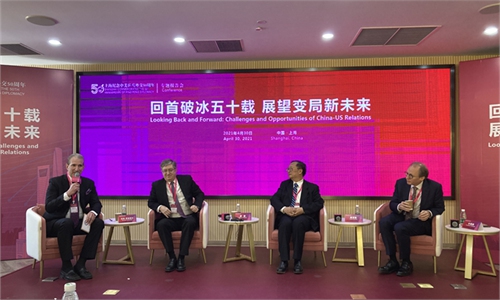
Illustration: Tang Tengfei/GT
British columnist Martin Wolf made a claim in his recent Financial Times article titled "China is wrong to think the US faces inevitable decline." Wolf wrote that it is wrong for Chinese elites to assume that the US is in irreversible decline. He justified his views by ranking the values of global companies.The first graphic from the article shows the top 20 companies in the world. Among them, there are 14 US ones, which demonstrate cutting-edge advantages. There are three Chinese companies on the list - Tencent (7th), Alibaba (9th) and TSMC (11th). The first two are mainland companies, and TSMC is from Taiwan. They all belong to the Greater China region, which means the development of the three companies relates to China.
The power of the US and its global status is supported by its strong companies. China's rise is also led by the rise of its robust companies. There is still a huge gap between US strength and China's rise. And Chinese elites are clear about this.
US decline is an international topic, and some Chinese scholars are only participants of this wider discussion. Many scholars from the world, including those in the US, believe that the US is in decline. They are not talking about its economic and financial might, but the systematic crisis and social divisions now encroaching the US. This is coupled with the much criticized US foreign policy of the Trump era. Wolf also noted this and wrote in the end of his article that "The biggest threat to the US role in the world lies in itself, not China."
But I would like to pose a question to Wolf, "Have you ever seen Chinese high-tech companies in the rankings of company values in history?" This must be the first time. Why could the above mentioned three Chinese companies rank among top 20 and leave US, European, Japanese and German companies behind?
First, the capital accumulation speed of the three companies is fast. It only took a decade for them to stand side by side with top US companies.
Second, the three companies are all high-tech companies. During the initial stage of their rise, they did not resort to the international market like US companies did. They relied on the domestic market. In other words, the strength and flexibility of the Chinese market sustained their development.
The third factor is the complete industrial system behind the Chinese companies. With a flexible and complete industrial system, China has the capability to produce cheap goods with good qualities.
Fourth, the rise of China's high-tech companies ended the era when developed countries could exploit excessive profits with monopolized technologies. It makes people around the world, especially developing countries, enjoy advanced technologies.
Capital, scale and manufacturing comprised the background of the rise of China's high-tech companies. The three factors also indicate the potential of Chinese companies to go global. This is what deeply worries the US and the West.
If Wolf wants to warn the Chinese people that it will be a long and difficult way for China to reach the development level of the US, I think the Chinese people would love to listen to his advice. But I would like to say that the most important thing is that Chinese companies and brands have popped up with lightning speed and stamina. This capital and economic phenomenon never happened during the 500 years of the West's global expansion.
There is only one European company on Wolf's list - a French enterprise. We could imagine this ranking 30 years or 50 years later. The US and Europe like to talk about ideology, but what is really on their minds is pure profits.
The fact that Chinese companies are going global is becoming more and more difficult, but this doesn't mean we will retreat. How can a company, which does not view the world as its driving force to gain technological advancement, which cannot lead world technology and consumption, and which does not take the world as its market to gain profits, become big and strong?
The global expansion of Chinese companies will become very tough. But they have no other choice. This must be one of the most prominent scenes in the changing patterns of the 21st century.
The author is a senior editor with People's Daily, and currently a senior fellow with the Chongyang Institute for Financial Studies at Renmin University of China. dinggang@globaltimes.com.cn. Follow him on Twitter @dinggangchina




